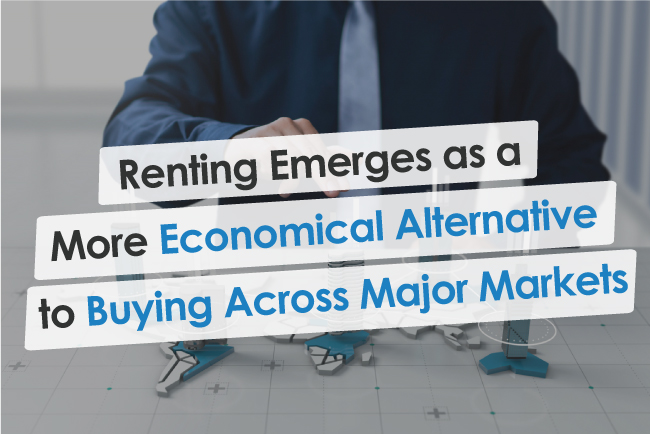In recent years, the landscape of the real estate industry has undergone a substantial transformation, marking a significant shift in the dynamics of renting versus buying. Although homeownership has long been perceived as the embodiment of the American dream, real estate economics is evolving, and it is becoming increasingly evident that renting is the more cost-effective choice in nearly all major markets. In this blog, we will explore the factors driving this shift and why renting is gaining favor among many Americans.
Escalating Home Prices and Affordability
One of the primary contributing factors to the growing preference for renting is the soaring prices of homes in major markets. Over the past decade, home prices have consistently outpaced income growth, making it progressively challenging for many individuals and families to afford the high down payments and the ongoing financial commitments that come with homeownership. With mortgage rates also rising, the threshold for prospective homebuyers has become substantially higher than ever before.
Shifting Perspectives on Housing
Another significant catalyst of this trend is the transformation in people’s perspectives on housing. Many individuals, especially younger ones, place a premium on flexibility and the capacity to adapt to changing life circumstances. Renting offers this sought-after flexibility, allowing individuals to easily relocate for job opportunities, alter their living arrangements, and sidestep the long-term commitment associated with homeownership.
Maintenance and Financial Considerations
Homeownership necessitates an array of ongoing expenses that renters often do not need to worry about. Property taxes, maintenance, repairs, and insurance are financial responsibilities homeowners bear, further contributing to the overall cost of property ownership. Renters, in contrast, frequently benefit from the peace of mind of knowing their monthly housing expenses without the concern of unforeseen repair costs or property taxes.
Alternatives in Investment
Another element to consider is the opportunity cost of locking up a significant amount of capital in a down payment and mortgage payments, especially when alternative investments are available. Some individuals invest their capital in stocks, bonds, or other financial ventures instead of channeling it into property. This approach can potentially yield higher returns and provide greater liquidity.
Local Market Dynamics
While the trend of renting becoming the more economical option is discernible nationally, the situation can significantly differ from one local market to another. In some high-demand markets, renting may still be relatively expensive, but in many regions, the economics of renting favor tenants.
Read More 4 Important Factors often overlooked by passive investors
Conclusion
The traditional perception of homeownership is transforming, and renting emerges as a more economical and flexible alternative across nearly all major markets. Individuals and families are reevaluating their housing choices, considering surging home prices, the financial burden of property maintenance, available investment alternatives, and a growing desire for flexibility. Although owning a home remains a cherished aspiration for many, the economic realities of today’s real estate market have made renting an attractive and pragmatic choice for an increasing number of individuals.
Ready to embrace affordability and flexibility? Start your stress-free living journey—choose renting over buying in major markets for more details be a part of investor club

